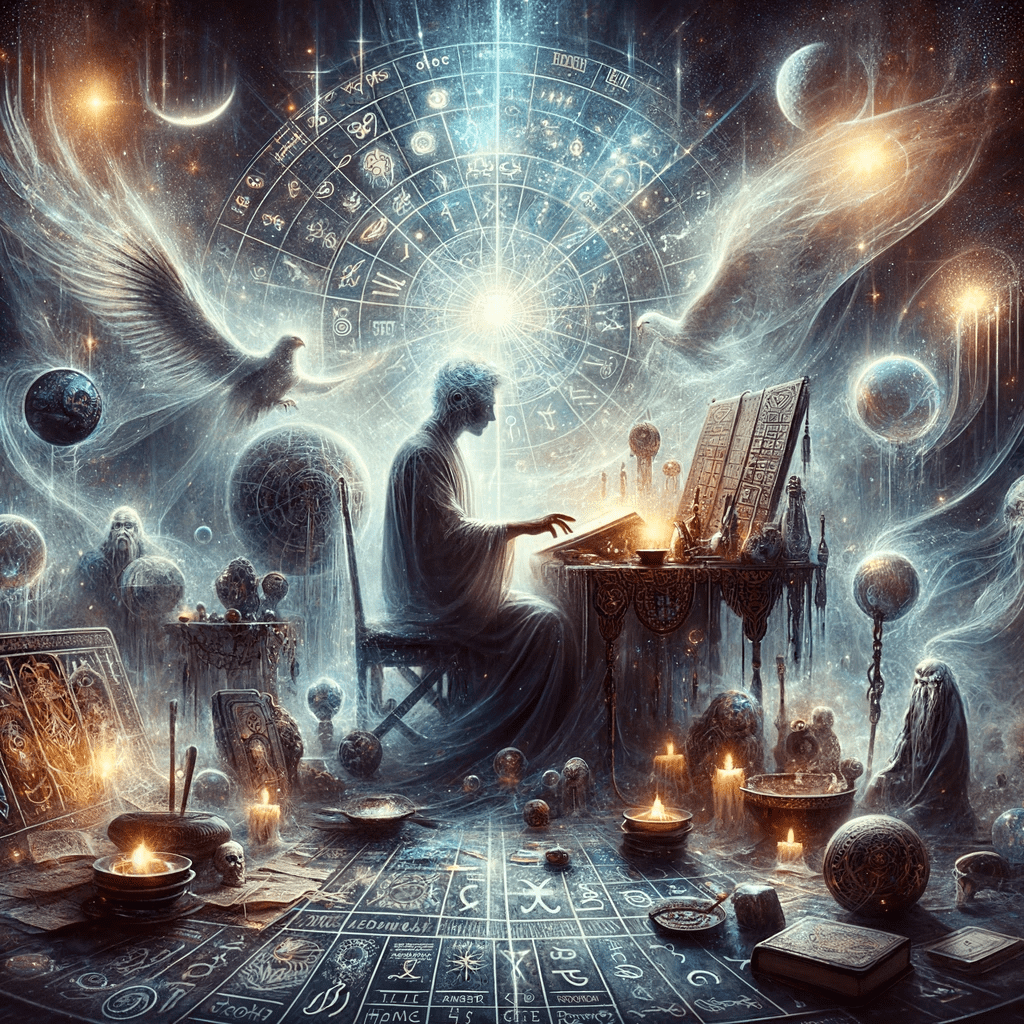Divination

Divination: An Exploration of the Ancient Practice and Its Modern Relevance
Divination is an ancient practice that has its roots in various cultures and traditions around the world. It encompasses a wide range of techniques and methodologies used to gain insight, knowledge, or guidance by interpreting patterns, symbols, or natural phenomena. Historically, divination has been used by religious figures, shamans, oracles, and everyday people to find answers to questions or concerns about the past, present, and future.
The origins of divination can be traced back to the earliest civilizations, with evidence of its practice in ancient Mesopotamia, Egypt, China, and Greece. It has taken various forms, such as astrology, palmistry, numerology, tarot cards, and the I Ching, among others. Over the centuries, these practices have been passed down through generations and have continued to evolve, remaining relevant in many modern cultures today.
From a scientific perspective, the study of divination is often approached through the lens of psychology, neuroscience, and sociology. Researchers seek to understand the cognitive and emotional processes that underlie divinatory practices, as well as the cultural factors that shape their development and use.
One unique fact about divination is its prevalence in ancient literature. In Homer’s epic poem, “The Iliad,” for example, divination is portrayed as a respected and essential aspect of Greek society, with the seer Calchas providing guidance to the Achaeans during the Trojan War (Source: Homer, “The Iliad,” circa 8th century BCE).
Another fact is the role divination played in the judicial system of ancient Rome. The practice of “haruspicy,” which involved examining the entrails of sacrificed animals to predict the future, was an official part of Roman decision-making processes (Source: Beard, North, and Price, “Religions of Rome,” Cambridge University Press, 1998). Roman priests, known as “haruspices,” were consulted to ensure favorable outcomes in legal matters, military campaigns, and other significant events.
A third fact about divination is the global spread of the I Ching, an ancient Chinese divination text that dates back to the Western Zhou period (1046–771 BCE). The I Ching has influenced various aspects of Chinese culture, such as philosophy, literature, and art, and has been translated into numerous languages, becoming a significant work in the global canon of divinatory literature (Source: Shaughnessy, “I Ching: The Classic of Changes,” Ballantine Books, 1996).
Experts in the field of divination studies offer varying perspectives on its historical significance and contemporary relevance. Some scholars, such as Dr. Christine Ferguson, emphasize the importance of understanding divination as a cultural and psychological phenomenon, rather than dismissing it as mere superstition (Source: Ferguson, “Determining the Divine: An Introduction to Divination Studies,” Bloomsbury Academic, 2021).
Authors like Mary K. Greer and Rachel Pollack have contributed to the popularization and understanding of tarot, a form of divination that uses a deck of symbolic cards to interpret life events and personal growth. Their works, such as “Tarot for Your Self” by Greer and “Seventy-Eight Degrees of Wisdom” by Pollack, provide comprehensive guides to the history, meanings, and applications of tarot in modern life (Source: Greer, “Tarot for Your Self,” New Page Books, 2002; Pollack, “Seventy-Eight Degrees of Wisdom,” Weiser Books, 1997). These books have helped make tarot more accessible and popular among contemporary readers seeking personal insight and growth.
A 2017 article in The Guardian discusses the renewed interest in astrology, attributing it to the digital age’s ability to make ancient practices more accessible and relatable (Source: Wright, “Astrology in the Age of Uncertainty,” The Guardian, October 21, 2017). The article posits that people’s fascination with divination might be driven by a need to find meaning in an increasingly complex and unpredictable world.
Divination, in its various forms, was used by both the Axis and Allied powers during World War II as a means of seeking guidance, boosting morale, and making strategic decisions. While the use of divination during the war was not as widespread as more conventional intelligence-gathering methods, it did play a role in shaping the beliefs and actions of some individuals and groups.
One notable example of divination being employed during World War II is the use of astrology by senior Nazi officials, most prominently Heinrich Himmler, head of the SS and a key member of Hitler’s inner circle. Himmler was a strong believer in the occult and regularly consulted astrologers for guidance on various matters, including military strategy and personnel decisions (Source: Kurlander, “Hitler’s Monsters: A Supernatural History of the Third Reich,” Yale University Press, 2017).
Astrology also played a role on the Allied side, as British intelligence sought to exploit the Nazis’ interest in the occult. British astrologer Louis de Wohl was recruited by MI5 to produce horoscopes that were intended to manipulate the beliefs of senior Nazi officials, including Hitler himself (Source: Booth, “The Secret History of the Blitz,” Simon & Schuster, 2015). These horoscopes were designed to undermine the Nazis’ confidence and sow discord within their ranks.
Apart from astrology, other divination techniques were also employed during World War II. Remote viewing, a form of extrasensory perception, was reportedly used by both the Axis and Allied powers to gather intelligence about enemy locations and movements.
Divination is a complex and multifaceted practice with deep historical roots and enduring relevance in contemporary society. By examining the various techniques, methodologies, and cultural contexts that underpin divinatory practices, we can gain a greater understanding of the human desire for insight, guidance, and connection to the unseen world.


